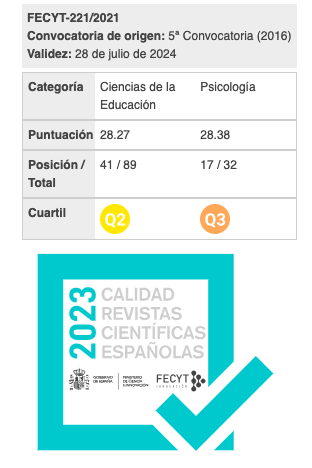Teacher-Student Relationships, Social and Emotional Skills, and Emotional and Behavioural Difficulties
Keywords:
Downloads
Abstract
In this study, the role of teacher-student relationships and students’ social and emotional skills as potential predictors of students’ emotional and behavioural difficulties was investigated by tapping into 962 primary school students’ perceptions via questionnaires. While significant correlations were found linking teachers’ interpersonal behaviour and students’ social and emotional skills to emotional and behavioural difficulties, data analysis indicated that students’ social and emotional skills were found to be more of a determinant of their behaviour than teachers’ interpersonal behaviour. Results are interpreted in relation to systems perspective and Social and Emotional Learning theory, and practical implications of the findings are discussedDownloads
References
Arbuckle, J. L. (2006). Amos 7.0 users’ guide. Chicago: Chicago, IL: SPSS, Inc.
Google Scholar CrossrefBirch, S.H. & Ladd, G.W. (1998). Children’s interpersonal behaviors and the teacher-child relationship. Developmental Psychology, 34 (5), 934-946.
Google Scholar CrossrefBandura, A. (1997). Self-Efficacy: The Exercise of Control. New York: W. H. Freeman.
Google Scholar CrossrefChou, K.L. (1997). The Matson Evaluation of Social Skills with Youngsters: Reliability and Validity of a Chinese Translation. Personality and Individual Differences, 22 (1), 123-125.
Google Scholar CrossrefChory-Assad, R.M. & Paulsel, M.L. (2004). Antisocial classroom communication: instructor influence and interactional justice as predictors of student aggression. Communication Quarterly, 52 (2), 98-114.
Google Scholar CrossrefCiarrochi, J. & Scott, G. (2006). The Link Between Emotional Competence and Well-Being: A Longitudinal Study. British Journal of Guidance and Counselling, 34 (2), 231-243.
Google Scholar CrossrefCooper, P. & Jacobs, B. (2011). From Inclusion to Engagement. Helping students engage with schooling through policy and practice. West Sussex: Wiley-Blackwell.
Google Scholar CrossrefDavis, H.A. (2001). The quality and impact of relationships between elementary school students and teachers. Contemporary Educational Psychology, 26, 431-453.
Google Scholar Crossrefden Brok, P., Brekelmans, M. & Wubbels, T. (2004). Interpersonal Teacher Behaviour and Student Outcomes. School Effectiveness and School Improvement, 15 (3-4), 407-442.
Google Scholar Crossrefden Brok, P., Brekelmans, M. & Wubbels, T. (2006). Multilevel issues in research using students’ perceptions of learning environments: The case of the Questionnaire on Teacher Interaction. Learning Environmental Research, 9, 199-213.
Google Scholar Crossrefden Brok, P., van Tartwijk, J., Wubbels, T. & Veldman, L. (2010). The differential effect of the teacher-student interpersonal relationship on student outcomes for students with different ethnic backgrounds. British Journal of Educational Psychology, 80, 199-221.
Google Scholar CrossrefGoleman, D. (1995). Emotional Intelligence. New York: Bantam.
Google Scholar CrossrefGoleman, D. (1998). Working with Emotional Intelligence. New York: Bantam Books.
Google Scholar CrossrefGoodman, R. (1999). The Extended Version of the Strengths and Difficulties Questionnaire as a Guide to Child Psychiatric Caseness and Consequent Burden. Journal of Child Psychology and Psychiatry, 40 (5), 791-799.
Google Scholar CrossrefGoodman, R., Renfrew, D. & Mullick, M. (2000). Predicting Type of Psychiatric Disorder from Strengths and Difficulties Questionnaire (SDQ) scores in child mental health clinics in London and Dhaka. European Child and Adolescent Psychiatry, 9 (2), 129-134.
Google Scholar CrossrefElias, M. (1997). The Missing Piece: Making the Case for Greater Attention to Social and Emotional Learning in the Schools. Education Week, 17 (5), 36-38.
Google Scholar CrossrefFraser, B.J. & Walberg, H.J. (2005). Research on teacher-student relationships and learning environments: Context, retrospect and prospect. International Journal of Educational Research, 43 (1-2), 103-109.
Google Scholar CrossrefFisher, D., Waldrip, B. & den Brok, P. (2005). Students’ perceptions of primary teachers’ interpersonal behaviour and of cultural dimensions in the classroom environment. International Journal of Educational Research, 43 (1), 25-38.
Google Scholar CrossrefGoh, S.C. & Fraser, B.J. (1998). Teacher interpersonal behaviour, classroom environment and student outcomes in primary mathematics in Singapore. Learning Environments Research, 1,199-229.
Google Scholar CrossrefHastings. P.D., Zahn-Waxler. C., Robinson. J., Usher. B. & Bridges. D. (2000). The development of concern for others in children with behavior problems. Developmental Psychology, 36 (5), 531-546.
Google Scholar CrossrefHenricsson, L. & Rydell, A.M. (2004). Elementary school children with behavior problems: Teacher-child relations and self-perception. A prospective study. Merrill-Palmer Quarterly, 50 (2), 111-138.
Google Scholar CrossrefHowes, C. & Hamilton, C.E. (1993). The changing experience of child care: changes in teachers and tacher-child relationships and children’s social competence with peers. Early Childhood Research Quarterly, 8, 15-32.
Google Scholar CrossrefHughes, J.N., Cavell, T.A. & Wilson, V. (2001). Further support for the developmental significance of the quality of the teacher-student relationship. Journal of School Psychology, 39 (4), 289-301.
Google Scholar CrossrefJang, H., Reeve, J. & Deci, E.L. (2010). Engaging students in learning activities: it is not autonomy support or structure but autonomy support and structure. Journal of Educational Psychology, 102 (3), 588-600.
Google Scholar CrossrefJennings, P.A. & Greenberg, M.T. (2009). The prosocial classroom: teacher social and emotional competence in relation to student and classroom outcomes. Review of Educational Research, 79 (1), 491-525.
Google Scholar CrossrefKyriakides, L. (2005). Drawing from teacher effectiveness research and research into teacher interpersonal behaviour to establish a teacher evaluation system: a study on the use of student ratings to evaluate teacher behaviour. Journal of Classroom Interaction, 40 (2), 44-66.
Google Scholar CrossrefLapointe, J.M., Legault, F. & Batiste, S.J. (2005). Teacher Interpersonal Behavior and Adolescents’ Motivation in Mathematics: A Comparison of Learning Disabled, Average, and Talented Students. International Journal of Educational Research, 43 (1-2), 39-54.
Google Scholar CrossrefLeary, T. (1957). An interpersonal diagnosis of personality. N. York: Ronald Press Company.
Google Scholar CrossrefLevy, J., den Brok P., Wubbels, T. & Brekelmans, M. (2003). Students’ Perceptions of Interpersonal Aspects of the Learning Environment. Learning Environments Research, 6, 5-36.
Google Scholar CrossrefLoukas, A., Ripperger-Suhler, K.G. & Horton, K.D. (2009). Examining temporal associations between school connectedness and early adolescent adjustment. Journal of Youth Adolescence, 38, 804-812.
Google Scholar CrossrefMarshburn, A.J., Pianta, R.C., Hamre, B.K., Downer, J.T., Barbarin, Q., Bryant, D. et al (2008). Measrures of classroom quality in pre-kindergarten and children’s development of academic, language and social skills. Child Development, 79, 732-749.
Google Scholar CrossrefMartin, A. J. & Dowson, M. (2009). Interpersonal relationships, motivation, engagement, and achievement: yields for theory, current issues, and educational practice. Review of Educational Research, 79 (1), 327-365.
Google Scholar CrossrefMatson, J.L., Macklin, G.F. & Helsel, W.J. (1985). Psychometric Properties of the Matson Evaluation of Social Skills with Youngsters (MESSY) with Emotional Problems and Self Concept in Deaf Children. Journal of Behavioral Therapy and Experimental Psychiatry, 16 (2), 117-123.
Google Scholar CrossrefMatson, J.L., Rotatori, A.F. & Helsel, W.J. (1983). Development of a Rating Scale to Measure Social Skills in Children: the Matson Evaluation of Social Skills with Youngsters (MESSY). Behavioral Research Therapy, 21 (4), 335-340.
Google Scholar CrossrefMavroveli, S., Petrides, K.V., Shove, C. & Whitehead, A. (2008). Investigation of the construct of trait emotional intelligence in children. European Child and Adolescent Psychiatry. Published online: 18/06/2008 (DOI 10.1007/s00787-008-0696-6).
Google Scholar CrossrefMcLaughlin, C. (2008). Emotional well-being and its relationship to schools and classrooms: a critical reflection. British Journal of Guidance and Counselling, 36 (4), 353-366.
Google Scholar CrossrefOgden, T. (2001). The Prevention and Management of Behaviour Difficulties in School. Research and Practice. In J. Visser. H. Daniels and T. Cole (Eds.). Emotional and Behavioural Difficulties in Mainstream Schools (pp.75-89). Oxford: Elsevier Science.
Google Scholar CrossrefPakaslahti, L., Karjalainen, A. & Keltikangas-Jarvinen, L. (2002). Relationships between adolescent prosocial problem-solving strategies. prosocial behaviour and social acceptance. International Journal of Behavioural Development, 26 (2), 137-144.
Google Scholar CrossrefPetrides, K.V., Frederickson, N. & Furnham, A. (2004). The Role of Trait Emotional Intelligence in Academic Performance and Deviant Behaviour at School. Personality and Individual Differences, 36, 277-293.
Google Scholar CrossrefPoulou, M. (2014). A theoretical framework towards understanding of emotional and behavioural difficulties. Asia Pacific Education Review, DOI: 10.1007/s12564-014-9313-1.
Google Scholar CrossrefPoulou, M. (in press). The Effects on students’ emotional and behavioural difficulties of teacher-student interactions, students’ social competencies and classroom context. British Educational Research Journal.
Google Scholar CrossrefPoulou, M. (2009). Predictors of prosocial behaviour and emotional and behavioural difficulties at school: A study of Greek adolescents’ perceptions. Paper presented at the second European Network for Socio-Emotional Competence in Children. Turkey, September.
Google Scholar CrossrefRyan, R.M. & Grolnick, W.S. (1986). Origins and pawns in the classroom: self-report and projective assessments of individual differences in children’s perceptions. Journal of Personality and Social Psychology, 50 (3), 550-558.
Google Scholar CrossrefRyan, A.M. & Shim, S.S. (2008). An exploration of young adolescents’ social achievement goals and social adjustment in middle school. Journal of Educational Psychology, 100 (3), 672-687.
Google Scholar CrossrefSutherland, K.S.,& Oswald, D.P. (2005). The relationship between teacher and student behavior in classrooms for students with emotional and behavioral disorders: transactional processes. Journal of Child and Family Studies, 14 (1), 1-14.
Google Scholar CrossrefTelli, S., den Brok, P., & Cakiroglu, J. (2007). Students’ perceptions of science teachers’ interpersonal behavior in secondary schools: Development of a Turkish version of the Questionnaire on Teacher Interaction. Learning Environment Research, 10, 115-129.
Google Scholar CrossrefTeodoro, M.L.M., Kappler, K.C., Rodrigues, J.L., de Freitas, P.M. & Haase, V.G. (2005). The Matson Evaluation of Social Skills with Youngsters (MESSY) and its Adaptation for Brazilian Children and Adolescents. Interamerican Journal of Psychology, 39 (2), 239-246.
Google Scholar CrossrefU.S. Department of Education (1998). A guide to safe schools: early warning timely response. Washington, DC: Author.
Google Scholar CrossrefWarden, D., Cheyne, B., Christie, D., Fitzpatrick, H. & Reid, K. (2003). Assessing children’s perceptions of prosocial and antisocial peer behaviour. Educational Psychology, 23 (5), 547-567.
Google Scholar CrossrefWubbels, T. (2005). Student Perceptions of Teacher-Student Relationships in Class. International Journal of Educational Research, 43 (1-2), 1-5. Editorial.
Google Scholar CrossrefWubbels, T. & Brekelmans, M. (2005). Two Decades of Research on Teacher-Student Relationships in Class. International Journal of Educational Research, 43 (1-2), 6-24.
Google Scholar CrossrefWubbels, T., Brekelmans, M., den Brok, P. & Tartwijk, J. (2006). An Interpersonal Perspective on Classroom Management in Secondary Classrooms in the Netherlands. In the Handbook of Classroom Management: Research, Practice and Contemporary Issues (p.1161-1191). London: Lawrence Erlbaum Associates.
Google Scholar CrossrefWubbels, T. & Creton, H.A. & Holvast, A. (1988). Undesirable classroom situations: A systems communication perspective. Interchange, 19 (2), 25-40.
Google Scholar CrossrefWubbels, T. & Creton, H.A. & Hooymayers, H.P. (1987). A school-based teacher induction programme. European Journal of Teacher Education, 10, 81-94.
Google Scholar CrossrefDownloads
Published
Almetric
Dimensions
How to Cite
Issue
Section
License
All articles are published under Creative Commons copyright (CC BY). Authors hold the copyright and retain publishing rights without restrictions, but authors allow anyone to download, reuse, reprint, modify, distribute, and/or copy articles as the original source is cited.
















